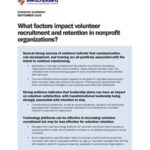Nonprofit organizations need smart, informed managers. This comprehensive introductory textbook aims to expose students to the range of responsibilities expected from modern nonprofit organizations and their boards, executive management, frontline staff, and community volunteers. Section 1 focuses on the characteristics of a nonprofit organization, with an explanation of the specific attributes of both charitable and member-serving nonprofits. It considers the historical development of the nonprofit sector as a whole and of the human services subsector in particular, culminating with a review of the political and economic climate in which nonprofits operate. Section 2 considers theories of leadership. The multiple roles of the nonprofit professional leader are delineated, to recognize that the same person may serve as manager and administrator, motivated by different priorities when functioning in each capacity. Ethical issues are also considered, along with the theoretical and practical aspects of decision-making, and the relationship between organizational culture and organizational change. Sections 3 and 4 address the specific skills of the nonprofit leader involved in securing material resources and managing human resources, respectively. The book concludes with a focus on the role of volunteers and the need for organizations to provide them good experiences if they want volunteers to keep coming back. Featuring an extended case study, this book is a useful guide for students and professionals new to the workplace on topics such as successfully managing change, strengthening programs, nurturing a dynamic board of directors, diversifying revenues, and building a strong, committed staff and volunteer corps.
A Systematic Review on the Impact of Trauma-Informed Education Programs on Academic and Academic-Related Functioning for Students Who Have Experienced Childhood Adversity
The purpose of this study was to conduct a systematic review of the existing literature regarding trauma-informed education programs and their impact on academic and academic-related outcomes. The articles included for review (n=15) contained data on trauma-informed education programs implemented in preschool, primary/elementary, and high school settings. Academic and academic-related outcomes reported included attendance, disciplinary…

